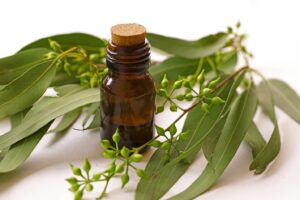
Essential oils are a popular topic among people who are enthusiastic about natural and holistic health practices. Indeed, research indicates that they can be beneficial in many ways! But are they helpful for sleep apnea? While they should not be used as a replacement for your regular treatment, they may play a role in promoting high-quality sleep! Here are a few essential oils that you might try:
Eucalyptus
When nasal allergies or colds cause upper airway congestion, the symptoms of obstructive sleep apnea (OSA) can worsen. Eucalyptus essential oil offers a potential solution by helping you breathe more easily. You may place a few drops in a diffuser to enjoy its soothing aroma or use a chest rub containing eucalyptus to experience its effects.
Peppermint
Peppermint essential oil offers anti-inflammatory properties that may reduce airway congestion. It is also capable of clearing mucus from the sinuses, allowing for improved breathing during sleep. Many individuals have reported that using peppermint oil leads to reduced snoring and a noticeable improvement in sleep quality.
Lavender
Lavender essential oil possesses mild sedative properties that help you relax and unwind at the end of the day. Its calming effects may allow you to fall asleep more quickly and experience deeper stages of sleep. This can prove particularly beneficial in managing the effects of obstructive sleep apnea, which often disrupts restorative rest.
Chamomile
Chamomile essential oil, like lavender, contributes to creating a calm and relaxed state of mind. It interacts with benzodiazepine receptors in your body to promote feelings of tranquility. You can use chamomile essential oil or drink chamomile tea before bed to enjoy its sleep-enhancing benefits.
Bergamot
Bergamot stands out with its citrusy yet floral aroma; it is a key component of Earl Grey tea. Known for its mood-boosting properties, this essential oil may uplift your spirits and promote better rest.
Tips for Safely Using Essential Oils
When incorporating essential oils into your wellness routine, you should observe several precautions to ensure their safe and effective use:
- Continue using your professional sleep apnea therapy as prescribed by your healthcare provider. Essential oils should serve as a supplement rather than a replacement for medical treatment.
- Experiment with different combinations of oils and methods of application, such as diffusing them into the air or applying them topically.
- Since essential oils are not tightly regulated, you ought to seek out reputable brands with a history of providing pure and high-quality products.
- Keep in mind that essential oils may trigger allergic reactions in some individuals. Conduct a patch test before applying them widely to ensure compatibility with your skin and respiratory system.
Essential oils are not a “cure” for sleep apnea, but they can promote high-quality rest. Give them a try to find out how they can work alongside your regular treatment to help you get the rejuvenating sleep you deserve.
Meet the Practice
At Weldon Cosmetic & Implant Dentistry of Ocala, Dr. Daniel Weldon is an experienced general dentist who is proud to offer sleep apnea treatment in the form of oral appliance therapy. This effective CPAP alternative has already helped countless patients. If you are interested in learning how it works, our team would be pleased to speak with you. Contact our office at 352-622-3236.

